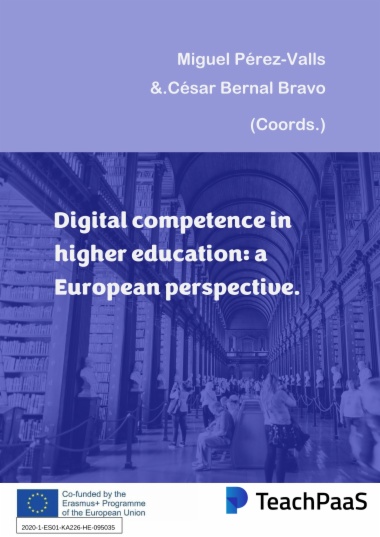This book is the result of a research project called EU-TeachPaaS, funded by the European Union through the Erasmus+ programme (2020-1-ES01-KA226-HE-095035). EU-TeachPaaS complies with the priority area “Innovative practices in a digital era” by supporting the taking up of digital technologies and of innovative and open pedagogies in higher education. This is done by developing 3 main trainings (OERs: Digital learning crash-course for students, Digital teaching toolkit for lecturers and Digital operations training for university administrators) that contain innovative educational technologies and pedagogies. By adopting this trilateral approach, EU-TeachPaaS aims to achieve a holistic and systemic result towards boosting the digital readiness of universities leading therefore to a wider use of digital technologies and open pedagogies in online learning. EUTeachPaaS will heavily rely on European frameworks on digital competences (i.e. DigComp, DigCompEdu) as the project will launch 6 pan-eu certification centres based on these frameworks for lecturers, students and university administrators. The certification will be based on the training and assessment developed within the project and offered for free to the community via OERs, open textbooks, free educational software (game/simulation based assessment, etc). EU-TeachPaaS is a highly-dynamic and flexible consortium that responds in a short time with the development of such solutions and is dedicated to provide a substantial amount of resources into achieving the envisioned outputs. With these efforts, EU-TeachPaas modernises existing capabilities of EU universities to deliver online education (as the developed training is not subject-specific and can be used as universal digital transformation/training framework for universities). By involving a university accreditation body as well as software developers for educational content, EU-TeachPaaS will capitalise the effort of the university and market-partners of its consortium and deliver high-quality digital content that will bring an immediate impact to its uptakers.
- Cover
- Copyright page
- Index
- Preface
- 1. Familiarity with operating and maximizing the efficiency use of online learning environments
- 2. Professional development skills in online education
- 3. Personal development and psychological wellbeing skills
- 4. Re-Learning how to learn
- 5. Professional engagement
- 6. Digital resources
- 7. Teaching and learning
- 8. Assessment
- 9. Empowering Learners
- 10. Micro-crash-course for building digital skills for university administrators
- 11. Online/digital education analytics incorporation strategy
- 12. Recommendations on upgrading quality assurance standards to foster online education
- 13. Online education marketing strategy in order to promote the benefit and necessity of online education

